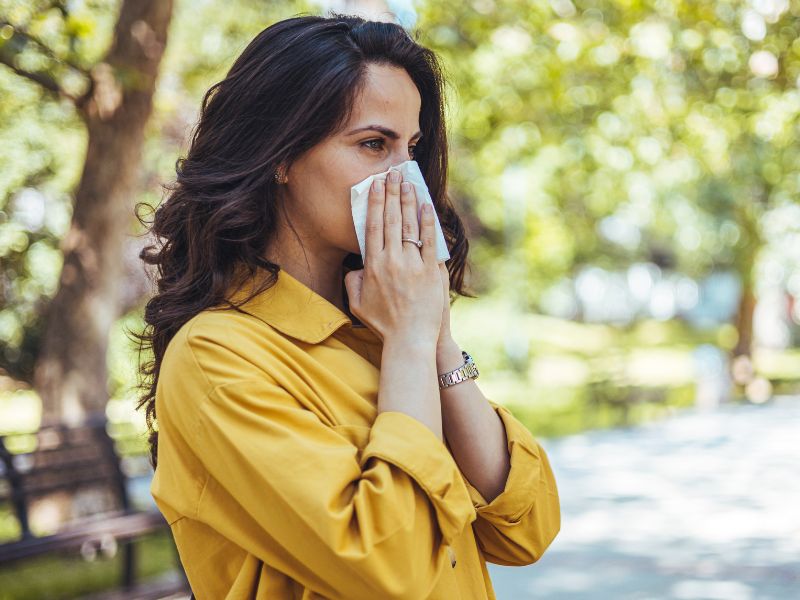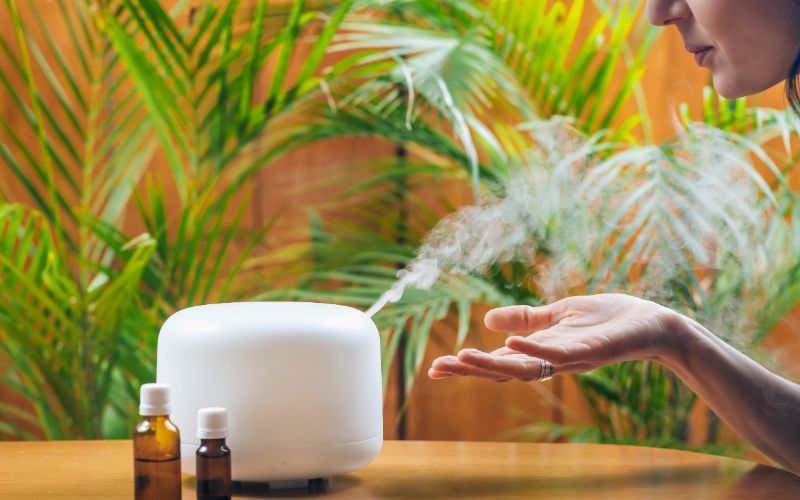To effectively stop allergy cough and ease discomfort, you should first focus on managing the triggers that irritate your airways. But can allergies cause coughing in the first place? Yes, exposure to allergens like dust, pet dander, or pollen often leads to persistent coughing that disrupts your day.
Fortunately, there are effective strategies to help manage allergy cough. At Penn Medicine Becker ENT & Allergy, you’re in expert hands. Our team combines advanced knowledge, personalized care, and years of experience to provide evidence-based solutions for lasting relief.

Tips to Manage and Treat an Allergy Cough
- Identifying the signs of an allergy cough, such as a persistent tickle or throat irritation, helps distinguish it from other types of coughs.
- Knowing your specific allergens—like pet dander, dust mites, or seasonal pollen—can guide effective prevention strategies.
- From over-the-counter antihistamines to natural remedies like honey and steam inhalation, there are various ways to soothe an allergy cough.
- Using air purifiers, and avoiding irritants like smoke can significantly reduce allergy symptoms.
- Consult an allergy specialist if symptoms persist or worsen.
How Does an Allergy Cough Compare to Other Coughs?
An allergy cough is your body’s reaction to allergens like dust mites, pet dander, or pollen. This type of cough can vary, showing up as a dry cough, a nagging cough, or even a severe, whooping-like cough. For some, an allergy cough can last for weeks, making daily activities uncomfortable, especially during high-pollen seasons.
However, not all persistent coughs are caused by allergies. Conditions such as colds, asthma, acid reflux, and even COVID-19 can also lead to coughing. Use this table to differentiate an allergy cough from other common types of coughs:
| Feature | Allergy Cough | Cold Cough | Asthma Cough | Acid Reflux Cough | COVID-19 Cough |
|---|---|---|---|---|---|
| Cause | Allergens like pollen, pet dander, dust mites, mold, or irritants | Viral infection | Airway inflammation and constriction | Stomach acid irritating the throat | SARS-CoV-2 virus |
| Triggers | Exposure to allergens, seasonal changes | Viral infections, cold weather | Exercise, cold air, allergens | Spicy or acidic foods, lying down | Exposure to infected individuals |
| Symptoms | Runny nose, sneezing, itchy eyes, throat irritation | Sore throat, nasal congestion, mild fever | Wheezing, shortness of breath, chest tightness | Heartburn, sour taste in mouth | Fever, fatigue, loss of taste/smell, body aches |
Symptoms of an Allergy Cough:
1. Recognize Your Personal Allergy Triggers
Identifying the triggers that cause your allergy cough is the first step towards managing it effectively. While these are some of the most common triggers for allergy coughs, there are several other allergens and irritants, such as smoke and perfume.
Pet Dander
Pet dander, a common allergen, is composed of tiny, even microscopic, flecks of skin shed by a variety of animals with fur or feathers. This includes cats, dogs, rodents, birds, and other household pets. These minute particles can become airborne allergens, easily inhaled, and cause an allergic reaction in some individuals.
Dust Mites
Dust mites, tiny microscopic creatures that are invisible to the naked eye, are known to thrive in warm, humid environments. They feed on our dead skin cells, making our bedding, upholstered furniture, and carpets, their ideal habitat. The accumulation of dust mites in these areas can be a common trigger for allergic reactions, including an allergy cough.
Pollen Seasons
Pollen is a common allergen that can cause seasonal allergies. Pollen grains are discharged into the air by trees, grasses, and weeds to fertilize other plants. When you inhale pollen, it can trigger an allergic reaction, including a cough.
Mold
Mold is a type of fungus that grows in damp, humid environments and releases spores into the air. These spores can irritate the airways and trigger an allergy cough in sensitive individuals.
Certain Foods
Certain foods, like nuts, dairy, or shellfish, can act as allergens for some people. Consuming these foods may irritate the throat and cause coughing as part of an allergic reaction.
Medications
Some medications, like antibiotics (e.g., penicillin), aspirin, or certain blood pressure drugs (e.g., ACE inhibitors), can cause allergic reactions in some people. These reactions may include coughing due to airway irritation.
Let an allergist help you identify and manage your allergy triggers
Manage your triggers with help from Penn Medicine Becker ENT & Allergy in New Jersey.
2. Treatments for an Allergy Cough
There are several allergy treatments available that can help manage a cough from allergies. These include over-the-counter medications, prescription drugs, and natural cough remedies.
Allergy Medications for Cough Relief
Over-the-counter and prescription allergy medications can help reduce the symptoms of an allergy cough.

Over-the-Counter Antihistamines
Antihistamines work by blocking the action of histamine, a substance in the body that causes allergic symptoms. Over-the-counter antihistamines can provide relief from an allergy cough. These include fexofenadine (Allegra) and loratadine (Claritin), which can provide relief without making you feel tired.

Decongestants and Expectorants
Decongestants are a type of medication that can provide temporary relief from a stuffy nose and sinus pressure, common symptoms of an allergic reaction. They work by constricting the blood vessels in your nasal passages, reducing swelling, and allowing air to flow more freely.
Natural Remedies for Soothing Coughs
Natural remedies can indeed be a potent ally in soothing an allergy cough, providing relief from the nagging, persistent cough that often accompanies exposure to common allergens.

Honey and Herbal Teas
Honey, a natural remedy, is known for its soothing properties that can alleviate a sore throat and reduce the frequency of an allergy cough. A spoonful of honey, especially when mixed with warm water, can provide immediate relief by coating the throat and reducing irritation. This natural mechanism can be particularly effective in managing a dry cough, a common symptom of allergies.

Steam Inhalation and Saline Rinse
Home remedies like using a humidifier or taking a hot shower can help to soothe a cough by adding moisture to the air and your throat. Similarly, a saline rinse can help to clear your nasal passages and reduce congestion.
3. Lifestyle Adjustments for Cough Relief
Making changes to your lifestyle can significantly help in managing and reducing the frequency of an allergy cough. Here are some steps you can take:
Allergy-Proofing Your Living Space
To reduce exposure to allergens, consider allergy-proofing your home. This may involve using allergen-proof covers on your mattresses, pillows, and box springs, washing your bedding regularly in hot water, and keeping your home clean and free of dust and pet dander.
Reducing Indoor and Outdoor Allergen Exposure
Minimizing your exposure to allergens both indoors and outdoors can help alleviate an allergy cough. This may mean keeping windows closed during pollen season, avoiding outdoor activities on high pollen days, and using air conditioning in your home and car.
Using Air Purifiers and Humidifiers
Air purifiers can help remove allergens from the air in your home, while humidifiers can add moisture to the air, which can soothe a dry throat and reduce coughing. Make sure to clean these devices regularly to prevent mold and bacteria buildup.
Staying Hydrated and Rested
Drinking plenty of fluids can help keep your throat moist and reduce coughing. Getting enough sleep is also important, as it can help your body recover and reduce the severity of allergy symptoms.
Avoiding Smoking and Irritants
Smoke and other irritants can worsen an allergy cough. Avoid smoking and exposure to secondhand smoke. Also, try to stay away from strong odors and fumes, such as those from cleaning products and perfumes.
Over 50 million Americans suffer from allergies each year, and a persistent cough is one of the most overlooked symptoms. If your cough won’t go away, it could be allergy-related—get expert care and lasting relief at Penn Medicine Becker ENT & Allergy.
When to Consult an Allergist or Doctor
If your allergy cough persists despite your efforts, it may be time to consult an allergist or doctor. They can provide a proper diagnosis and recommend treatment options tailored to your specific needs.
If you’re looking for an allergy clinic in Hillsborough, NJ, Penn Medicine Becker ENT & Allergy serves areas Raritan, Martinsville, Bound Brook, Somerville, Skillman, Montgomery, Manville, or Millstone. Contact us today and schedule a consultation.

